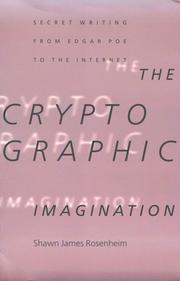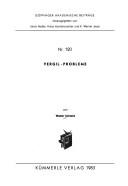| Listing 1 - 5 of 5 |
Sort by
|

ISBN: 080185332X Year: 1997 Publisher: Baltimore ; London Johns Hopkins University Press
Abstract | Keywords | Export | Availability | Bookmark
 Loading...
Loading...Choose an application
- Reference Manager
- EndNote
- RefWorks (Direct export to RefWorks)
Influence (Literary, artistic, etc.) --- Internet --- Cold War --- Ciphers in literature --- Cryptography in literature
Book
Year: 2019 Publisher: Johns Hopkins University Press
Abstract | Keywords | Export | Availability | Bookmark
 Loading...
Loading...Choose an application
- Reference Manager
- EndNote
- RefWorks (Direct export to RefWorks)
Originally published in 1996. In The Cryptographic Imagination, Shawn Rosenheim uses the writings of Edgar Allan Poe to pose a set of questions pertaining to literary genre, cultural modernity, and technology. Rosenheim argues that Poe's cryptographic writing—his essays on cryptography and the short stories that grew out of them—requires that we rethink the relation of poststructural criticism to Poe's texts and, more generally, reconsider the relation of literature to communication. Cryptography serves not only as a template for the language, character, and themes of much of Poe's late fiction (including his creation, the detective story) but also as a "secret history" of literary modernity itself. "Both postwar fiction and literary criticism," the author writes, "are deeply indebted to the rise of cryptography in World War II." Still more surprising, in Rosenheim's view, Poe is not merely a source for such literary instances of cryptography as the codes in Conan Doyle's "The Dancing-Men" or in Jules Verne, but, through his effect on real cryptographers, Poe's writing influenced the outcome of World War II and the development of the Cold War. However unlikely such ideas sound, The Cryptographic Imagination offers compelling evidence that Poe's cryptographic writing clarifies one important avenue by which the twentieth century called itself into being. "The strength of Rosenheim's work extends to a revisionistic understanding of the entirety of literary history (as a repression of cryptography) and then, in a breathtaking shift of register, interlinks Poe's exercises in cryptography with the hyperreality of the CIA, the Cold War, and the Internet. What enables this extensive range of applications is the stipulated tension Rosenheim discerns in the relationship between the forms of the literary imagination and the condition of its mode of production. Cryptography, in this account, names the technology of literary production—the diacritical relationship between decoding and encoding—that the literary imagination dissimulates as hieroglyphics—the hermeneutic relationship between a sign and its content."—Donald E. Pease, Dartmouth College
Modernism (Literature) --- Internet. --- Influence (Literary, artistic, etc.) --- Detective and mystery stories, American. --- Cryptography in literature. --- Cryptography. --- Ciphers in literature. --- American literature. --- Cold War. --- Ciphers in literature. --- Internet. --- Cryptography in literature. --- World War, 1939-1945 --- Influence (Literary, artistic, etc.) --- Modernism (Literature) --- American literature --- Detective and mystery stories, American --- Cryptography. --- History and criticism. --- History and criticism. --- Poe, Edgar Allan, --- Poe, Edgar Allan, --- Poe, Edgar Allan, --- Influence. --- Cryptography. --- Cold War (1945-1989) --- World War (1939-1945) --- 1939-1945 --- United States. --- Literary theory
Book
Year: 2019 Publisher: Johns Hopkins University Press
Abstract | Keywords | Export | Availability | Bookmark
 Loading...
Loading...Choose an application
- Reference Manager
- EndNote
- RefWorks (Direct export to RefWorks)
Originally published in 1996. In The Cryptographic Imagination, Shawn Rosenheim uses the writings of Edgar Allan Poe to pose a set of questions pertaining to literary genre, cultural modernity, and technology. Rosenheim argues that Poe's cryptographic writing—his essays on cryptography and the short stories that grew out of them—requires that we rethink the relation of poststructural criticism to Poe's texts and, more generally, reconsider the relation of literature to communication. Cryptography serves not only as a template for the language, character, and themes of much of Poe's late fiction (including his creation, the detective story) but also as a "secret history" of literary modernity itself. "Both postwar fiction and literary criticism," the author writes, "are deeply indebted to the rise of cryptography in World War II." Still more surprising, in Rosenheim's view, Poe is not merely a source for such literary instances of cryptography as the codes in Conan Doyle's "The Dancing-Men" or in Jules Verne, but, through his effect on real cryptographers, Poe's writing influenced the outcome of World War II and the development of the Cold War. However unlikely such ideas sound, The Cryptographic Imagination offers compelling evidence that Poe's cryptographic writing clarifies one important avenue by which the twentieth century called itself into being. "The strength of Rosenheim's work extends to a revisionistic understanding of the entirety of literary history (as a repression of cryptography) and then, in a breathtaking shift of register, interlinks Poe's exercises in cryptography with the hyperreality of the CIA, the Cold War, and the Internet. What enables this extensive range of applications is the stipulated tension Rosenheim discerns in the relationship between the forms of the literary imagination and the condition of its mode of production. Cryptography, in this account, names the technology of literary production—the diacritical relationship between decoding and encoding—that the literary imagination dissimulates as hieroglyphics—the hermeneutic relationship between a sign and its content."—Donald E. Pease, Dartmouth College
Modernism (Literature) --- Internet. --- Influence (Literary, artistic, etc.) --- Detective and mystery stories, American. --- Cryptography in literature. --- Cryptography. --- Ciphers in literature. --- American literature. --- Cold War. --- Ciphers in literature. --- Internet. --- Cryptography in literature. --- World War, 1939-1945 --- Influence (Literary, artistic, etc.) --- Modernism (Literature) --- American literature --- Detective and mystery stories, American --- Literary theory --- Cryptography. --- History and criticism. --- History and criticism. --- Poe, Edgar Allan, --- Poe, Edgar Allan, --- Poe, Edgar Allan, --- Influence. --- Cryptography. --- Cold War (1945-1989) --- World War (1939-1945) --- 1939-1945 --- United States. --- Literary theory
Book
Year: 2019 Publisher: Johns Hopkins University Press
Abstract | Keywords | Export | Availability | Bookmark
 Loading...
Loading...Choose an application
- Reference Manager
- EndNote
- RefWorks (Direct export to RefWorks)
Originally published in 1996. In The Cryptographic Imagination, Shawn Rosenheim uses the writings of Edgar Allan Poe to pose a set of questions pertaining to literary genre, cultural modernity, and technology. Rosenheim argues that Poe's cryptographic writing—his essays on cryptography and the short stories that grew out of them—requires that we rethink the relation of poststructural criticism to Poe's texts and, more generally, reconsider the relation of literature to communication. Cryptography serves not only as a template for the language, character, and themes of much of Poe's late fiction (including his creation, the detective story) but also as a "secret history" of literary modernity itself. "Both postwar fiction and literary criticism," the author writes, "are deeply indebted to the rise of cryptography in World War II." Still more surprising, in Rosenheim's view, Poe is not merely a source for such literary instances of cryptography as the codes in Conan Doyle's "The Dancing-Men" or in Jules Verne, but, through his effect on real cryptographers, Poe's writing influenced the outcome of World War II and the development of the Cold War. However unlikely such ideas sound, The Cryptographic Imagination offers compelling evidence that Poe's cryptographic writing clarifies one important avenue by which the twentieth century called itself into being. "The strength of Rosenheim's work extends to a revisionistic understanding of the entirety of literary history (as a repression of cryptography) and then, in a breathtaking shift of register, interlinks Poe's exercises in cryptography with the hyperreality of the CIA, the Cold War, and the Internet. What enables this extensive range of applications is the stipulated tension Rosenheim discerns in the relationship between the forms of the literary imagination and the condition of its mode of production. Cryptography, in this account, names the technology of literary production—the diacritical relationship between decoding and encoding—that the literary imagination dissimulates as hieroglyphics—the hermeneutic relationship between a sign and its content."—Donald E. Pease, Dartmouth College
Cold War. --- Ciphers in literature. --- Internet. --- Cryptography in literature. --- World War, 1939-1945 --- Influence (Literary, artistic, etc.) --- Modernism (Literature) --- American literature --- Detective and mystery stories, American --- Cryptography. --- History and criticism. --- Poe, Edgar Allan, --- Influence. --- Cold War (1945-1989) --- World War (1939-1945) --- 1939-1945 --- United States. --- Literary theory

ISBN: 3874526267 Year: 1983 Publisher: Göppingen
Abstract | Keywords | Export | Availability | Bookmark
 Loading...
Loading...Choose an application
- Reference Manager
- EndNote
- RefWorks (Direct export to RefWorks)
Virgil --- Cryptography in literature --- Latin poetry --- -Rome in literature --- Latin literature --- History and criticism --- -Virgilio Marone, P. --- Vergilius Maro, Publius --- Vergilīĭ --- Virgile --- Vergílio --- Wergiliusz --- Vergilīĭ Maron, P. --- Vergilīĭ Maron, Publīĭ --- Verhiliĭ Maron, P. --- Vergil --- Virgilio --- Virgilīĭ --- Virgilius Maro, P. --- Virgilius Maro, Publius --- Virgil Maro, P. --- ווירגיל --- וירגיליוס --- ורגיליוס --- מרו, פובליוס ורגיליוס --- فرجيل --- Pseudo-Virgil --- Pseudo Virgilio --- Virgilio Marón, Publio --- Bhārjila --- Authorship --- Cryptography in literature. --- Rome in literature. --- History and criticism. --- Authorship. --- Catalepton. --- Culex. --- -Authorship --- -Virgilio Marone, P., --- Vergilīĭ, --- Virgile, --- Vergílio, --- Wergiliusz, --- Vergilīĭ Maron, Publīĭ, --- Verhiliĭ Maron, P., --- Vergil, --- Virgilio, --- Virgilīĭ, --- Virgilius Maro, P., --- Virgilius Maro, Publius, --- Virgil Maro, P., --- ווירגיל, --- וירגיליוס, --- ורגיליוס, --- מרו, פובליוס ורגיליוס, --- فرجيل, --- Pseudo-Virgil, --- Pseudo Virgilio, --- Virgilio Marón, Publio, --- Bhārjila, --- -Vergil --- Virgilio Máron, Publio --- Vergili Maronis, Publius --- Appendix Vergiliana. --- Catalecta --- Catalects --- Rome --- In literature. --- Virgilio Marone, P., --- Vergilius Maro, P. --- Vergilius --- Virgilio Marone, P. --- Marone, Publio Virgilio
| Listing 1 - 5 of 5 |
Sort by
|

 Search
Search Feedback
Feedback About UniCat
About UniCat  Help
Help News
News